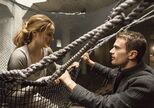I happened to be reading "Meditations on First Philosophy", and suddenly I remembered the plot of the dream test in this movie. The movie was indeed watched when I was in high school, and I probably forgot the plot, but I still think the faction test is very interesting.
The principle is a bit like the Sorting Hat. Sitting on a device, the heroine enters a dream. The dream is different according to the fears in the tester's heart. Other ordinary people, after entering the dream, need to try their best to overcome difficulties to complete the test. It will take about ten minutes, and the heroine, after entering the dream of the test, faces her deepest fear, the heroine's reaction is to try to remind herself "It's not real!", and then the dream is broken, the heroine It takes about three or four minutes to complete the test. The test officer (Maggie Q) was taken aback and told the heroine that people like her are defined as divisives, genetically flawed and cannot be classified into any faction. She must keep her identity a secret, otherwise she will be eliminated.
First, the test was defined as a dream-like thing, in which the task is to be completed in normal programming. Normal people in such a test are roughly the same as in a dream. They can't distinguish the test from reality (can't tell themselves that this is a dream like the heroine), and the concept of the test is just like the concept of Descartes' dream. Only after completing the test will normal people suddenly realize that they are in a fantasy world when they are conducting the test just now. Then, it is also feasible to put the "test" into the dream argument, excluding the existence of those who disagree.
For normal people, the argument for the divergent test (modeled on the dream argument):
1) If sensory knowledge is reliable, then there must be clear criteria for distinguishing reliable sensory knowledge from unreliable sensory knowledge.
2) Sensory cognition in the test is unreliable. (After the test is completed, you will understand that you are doing the test just now, and you have not really faced situations such as snake pits and fire pits in reality. The cognition of snakes and fire is actually unreliable)
3) There is no standard that clearly distinguishes sensory perceptions obtained during testing from general (untested) sensory perceptions.
4) If general (untested) sensory cognition satisfies proposition 1), then there is such a distinction criterion
5) This contradicts Proposition 3)
The heroine was actually awake during the test, and she understood that she could not suddenly encounter such a scene, that is, for her, there were different standards. Then it suddenly feels a bit interesting to think about it. The equipment and programs tested were made by humans. Unlike the dream described by Descartes, this test is determined by its own nature and should have standards that can distinguish it from reality. Since the heroine can use her own rationality as the standard to distinguish the test from reality, it also shows that this standard already existed when the test was set. If it is a dream, it is only a flawed dream. The argument of the Divergent Test does not hold for the heroine and the Divergent. However, normal people other than divergent people cannot find the difference between the test and reality. Then, since a "flawed dream" can be found flawed in the eyes of divergent people and perfect in the eyes of normal people, the flawed party between divergent people and normal people should obviously be "normal people". . Divergents are to normal people as God is to human beings (God cannot be deceived by the devil, God cannot fall into a dream), for normal people, from the Cartesian point of view, their perceptions are unreliable .
Interestingly, at the end, the author revealed that in "Divergent", Chicago, the only remaining human civilization, is actually just a large-scale testing ground. Normal people are actually genetically defective, and divergent people are the real normal people. This seems to be similar to the conclusion we have drawn from the argument of the test. Is it the author's setting or coincidence? we don't know
View more about Divergent reviews






